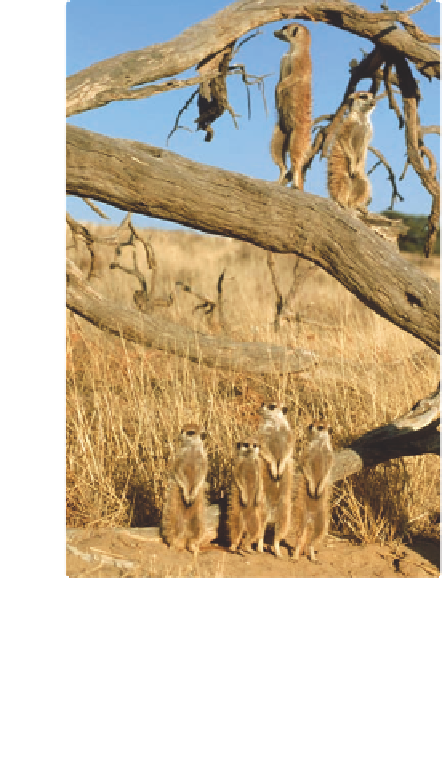Travel Reference
In-Depth Information
Wildlife Watching
Top of the wish list of the majority of safari tourists is the iconic Big Five (lion, elephant,
buffalo, rhino and leopard), yet southern Africa is home to far more animals of interest as
well as hundreds of species of birds. Below are four responsibly managed experiences
where you'll get up close to some of Africa's lesser-known animals without unduly
disturbing them. These trips help raise awareness about their plight and provide much-
needed income that contributes to their survival.
204 Wake up with meerkats, South
africa
The jeep stops at 5.30am outside dusty
Oudsthoorn, a small town in the Western Cape.
Everyone in the group gets out and walks a
short distance away, tired but excited, binoculars
trained on the holes in the bare ground nearby.
A few minutes pass. Then, without warning, a
furry head pops up like a jack-in-the-box. And
another. Suddenly a group of sleepy meerkats
are bobbing up and down, sunning themselves,
foraging for food and
playfighting.
Meerkats are normally
shy creatures, and
it's thanks to Grant
Mcilrath (known
hereabouts as “Meerkat
Man”) that this insight
into their world is
possible: they are used
to him, and he knows
how to find out which
burrows in the 10km-
wide conservation area
they will have moved
to overnight. As the
sun rises higher and
the urge to giggle at
their antics subsides,
the meerkats approach
to within a few metres,
seemingly unfazed.
Before your stomach has
even rumbled for breakfast, you've witnessed up
close an animal society that few get the chance
to see even from a distance.
Need to know
The Meerkat Magic Conservation
Project, from where tours start, is in Oudsthoorn,
accessible via Routes 62 or 328. Tours cost
ZAR600, to be paid in cash. For more info on tours
and booking see
W
www.meerkatmagic.com;
T
+27
(0) 82 413 6895.
205 Voluntary services underseas,
Madagascar
Some of the best diving in the Indian Ocean
is off the west coast of Madagascar, where you
can put your skills to good use on a voluntary
conservation expedition with Blue Ventures, a
marine conservation organization. Participants
learn to identify the coral and fish species in
the lagoons of the Grand Récif de Tuléar - one
of the largest coral reefs in the world - and
gather data for scientists that will help establish
a management plan for preserving the reef
systems. Expeditions last between six and twelve
weeks; on average there are fourteen volunteers
at the camp and never more than two volunteers
per staff member. If you're in any doubt about
whether it's for you, Blue Ventures helps put you
in touch with previous volunteers - so you can
find out exactly what the local rum punch is like.
Meerkats sunning themselves
in the early morning light
Need to know
Expeditions run throughout the
year. For more on research programmes and costs
see
W
www.blueventures.org;
T
+44 (0) 20 8341
9819.





















Search WWH ::

Custom Search